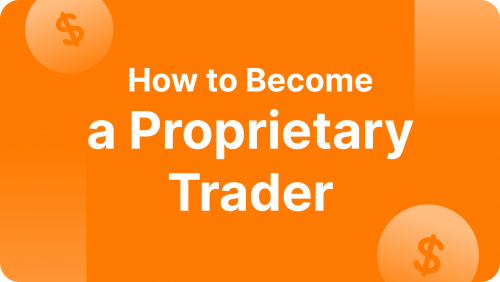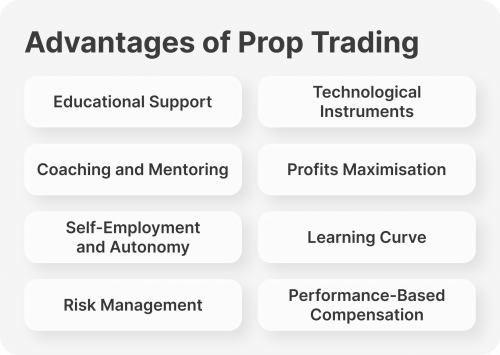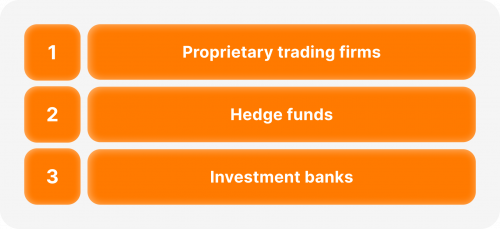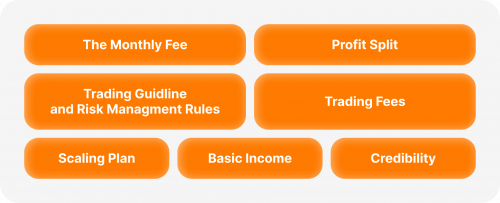How to Become a Proprietary Trader in 2024: Career Paths

The financial world thrives on the constant movement of assets – stocks, bonds, currencies, etc. Proprietary traders, also known as prop traders, are the driving force behind a significant portion of this activity. This career path offers lucrative rewards but also demands a high level of expertise, discipline, and risk management. In this comprehensive guide, we’ll explore how to become a proprietary trader, discover salary expectations, and outline the career path for aspiring traders.
Key Takeaways
- Proprietary or prop traders use their skills and knowledge to trade financial instruments for a firm’s capital, with the potential for high earnings.
- A strong foundation in finance, mathematics, and trading strategies is crucial to becoming a prop trader.
- Gaining experience through internships and prop firm challenges can enhance your application for prop trader jobs.
- The prop trader career path offers diverse opportunities across different asset classes, trading styles, and firm structures.
What is Proprietary Trading?
Proprietary trading, often called “prop trading,” involves a financial firm or commercial bank investing for direct market gain rather than earning commission dollars by trading on behalf of clients. The key goal is to make a profit from the firm’s capital by engaging in various investment activities. Prop traders use sophisticated strategies and leverage to enhance their returns.
Unlike traditional traders who manage client funds, prop traders use a firm’s capital to execute trades, aiming to generate profits. This fast-paced, high-pressure environment attracts individuals with a strong understanding of financial markets, exceptional analytical skills, and a desire for risk-reward challenges.
Prop trading encompasses a vast array of asset classes and trading styles.
- Equities: Trading stocks and options.
- Fixed Income: Trading bonds, government securities, and other debt instruments.
- Foreign Exchange (Forex): Trading currencies.
- Commodities: Trading agricultural products, metals, energy, and other raw materials.
- Derivatives: Trading contracts based on underlying assets like stocks, bonds, or currencies.
- High-Frequency Trading (HFT): Leveraging advanced technology to execute trades at lightning speeds.
- Statistical Arbitrage: Identifying pricing discrepancies between related securities.
- Event-Driven Trading: Capitalising on specific corporate events like mergers, acquisitions, or earnings releases.
- Discretionary Trading: Relying on individual judgment and experience to make trading decisions.
Visible advantages of proprietary trading are:
- Since firms trade with their own money, they can potentially earn higher profits than commissions from client trades.
- Proprietary trading firms often have access to superior technology, market data, and research, providing a competitive edge.
- Prop traders often have more freedom to develop and implement their own trading strategies, fostering innovation and personal growth.
- Firms are highly focused on risk management techniques, allowing traders to learn advanced strategies to protect their capital.

Understanding the core aspects of proprietary trading is crucial for anyone interested in pursuing a career in this field. It involves the firm’s own capital, distinct differences from traditional trading, and offers significant advantages in terms of profit potential and resource availability.
Fast Fact
The concept of proprietary trading began in the early 20th century when banks and financial institutions started using their capital to trade securities. This practice was initially limited to a few elite firms with significant resources and expertise.
Proprietary Trader Career Path

A proprietary trader is responsible for executing trades using the firm’s capital. They analyse market trends, employ complex trading strategies, and manage risk to achieve high returns. The role demands a deep understanding of financial markets, quick decision-making, and the ability to handle stress. Let’s explore the steps in the career path of a prop trader:
Entry-Level Positions
Most proprietary traders start their careers in entry-level positions like trading assistants or junior traders. These roles provide valuable exposure to the trading environment and allow individuals to learn the ABCs under the guidance of experienced traders.
Advancing to Full Trader
With experience and a proven track record, junior traders can advance to full trader positions. This transition typically involves taking on more significant responsibilities, including managing more extensive portfolios and developing independent trading strategies.
Senior Trader and Beyond
Senior traders have extensive experience and consistently deliver high returns. They often mentor junior traders and may take on leadership roles within proprietary trading firms. Some senior traders eventually start their own proprietary trading businesses.
Is a Career in Proprietary Trading Right for You?
Before hopping on the journey to becoming a prop trader, consider the following:
- A deep understanding of financial markets and their intricacies is essential.
- Strong analytical skills and the ability to interpret complex financial data are non-negotiable.
- Prop trading involves a high degree of risk. You must be comfortable with the possibility of significant losses.
- The fast-paced environment demands exceptional stress management skills to make sound decisions under pressure.
- Success in prop trading requires strict discipline and effective time management to consistently monitor markets and execute strategies.
Skills Required for a Successful Proprietary Trader Career
Successful proprietary traders possess a combination of analytical prowess, risk management expertise, quick decision-making abilities, and strong mathematical skills. Additionally, discipline and emotional control are essential to navigate the volatile nature of financial markets. Cultivating these skills and qualities is crucial for anyone aspiring to excel in proprietary trading.
Here are the necessary skills and qualities in detail:
Analytical Skills
- Ability to interpret and analyse vast amounts of market data to identify trends and patterns.
- Assessing market conditions and making informed decisions based on data and market indicators.
- Quickly devising solutions to unexpected market movements and challenges.
Risk Management
- Recognising potential risks in trading strategies and market conditions.
- Implementing strategies to minimise losses and protect capital.
- Spreading investments across various assets to reduce risk.
Decision-Making Under Pressure
- Making rapid decisions in fast-paced market environments.
- Trusting one’s analysis and strategies even during volatile market conditions.
- Adjusting strategies based on real-time market changes and unexpected developments.
Mathematical and Statistical Knowledge
- Using mathematical models to predict market movements and optimise trading strategies.
- Applying statistical methods to analyse market data and assess probabilities.
- Understanding concepts such as derivatives, options pricing, and risk metrics.
Discipline and Emotional Control
- Sticking to trading plans and strategies without deviating due to emotions.
- Managing emotions such as fear and greed to avoid impulsive decisions.
- Waiting for the right opportunities and not forcing trades in unfavourable conditions.
Additional Skills
- Proficiency in using trading software, algorithms, and other technological tools, as well as trading skills.
- Clear communication skills for collaborating with team members and presenting ideas.
- Commitment to staying updated with market trends, new technologies, and evolving strategies.
Education and Training
A strong foundation in finance, economics, mathematics, or related fields is beneficial. Many proprietary traders hold degrees in these disciplines, providing them with the analytical skills needed for the job.
Professional Certifications and Licenses
Professional certifications and licenses demonstrate a commitment to the profession and a thorough understanding of financial principles. Consider receiving these certifications:
- Series 7: Administered by FINRA, this license allows individuals to trade various securities.
- Series 56: Specific to proprietary traders, covering rules and regulations about prop trading.
- Chartered Financial Analyst (CFA): A globally recognised certification covering various investment topics and ethical standards.
- Certified Financial Risk Manager (FRM): Focuses on risk management principles, an essential skill for proprietary traders.
Training Programs and Internships
Many proprietary trading firms offer training programs and internships for aspiring traders. These programs provide hands-on experience and exposure to real-world trading scenarios.
Importance of Continuous Learning
- Financial markets constantly evolve; staying informed about the latest trends, tools, and technologies is crucial.
- Engaging in continuous education through specialised courses, seminars, and workshops.
- Regularly reading financial news, research papers, and books to deepen knowledge and understanding.
Salary Expectations for Proprietary Traders
Prop trader salaries are a major draw for many aspiring traders. While there’s no guaranteed income, prop traders have the potential to earn significant sums based on their performance. Compensation structures typically involve a base salary and a performance-based bonus, with a portion of the profits generated from successful trades going to the trader.

Entry-Level Salaries
Entry-level proprietary traders can expect to earn a base salary ranging from $50,000 to $70,000 per year, depending on the firm and location. Bonuses and profit-sharing can significantly increase total compensation.
Experienced Traders
Experienced proprietary traders often earn six-figure salaries. According to Glassdoor, the average salary for a proprietary trader in the United States is approximately $90,000 yearly, with top performers earning well over $200,000 annually.
Senior Traders and Beyond
Senior traders and those in leadership positions within proprietary trading firms can earn substantial incomes, often exceeding $500,000 annually, including bonuses and profit-sharing.
Finding Proprietary Trader Jobs
While some proprietary traders enter the field with a bachelor’s degree and follow a traditional route outlined above, this is not the only way. With the rise of remote work, there are various methods to break into prop trading:
Funded Trading Account – Becoming a Funded Trader
In recent years, numerous trading programs have emerged offering online funded trading accounts. Applying to one of these programs may provide you with a proprietary-funded account with the firm’s capital. Once you qualify and meet the firm’s requirements, you gain access to a fully funded account with the firm’s resources. During the evaluation period, you must adhere to the firm’s specific conditions and risk management rules. Funded trading is an excellent starting point for a trading career, allowing you to trade with no personal capital risk while retaining a significant portion of the profits.
Proprietary Trading Firm
A traditional approach involves earning a bachelor’s degree and applying to reputable trading firms or investment banks with solid reviews. Many top prop trading firms offer 6-12 month internships, providing training and mentorship. During this period, you’ll learn trading strategies, styles, and risk management rules. Interns are not required to maintain a profitable account balance but must master the firm’s risk management guidelines and develop a trading strategy. Generally, firms expect their traders to become profitable within six months of completing the internship.
Find Investors and Secure Trading Capital
Another path is to seek investors willing to fund your trading account independently. This route typically requires a proven trading track record to attract potential investors. You’ll need to network with large investors or hedge funds to secure capital.
Job Boards and Recruiters
Job boards such as eFinancialCareers and Indeed often list proprietary trader positions. Additionally, finance recruiters can assist in finding suitable opportunities based on your qualifications and experience.
Mentorship and Collaboration
Working with experienced traders and mentors can provide valuable insights and accelerate career growth. Collaboration within a trading firm fosters the exchange of ideas and strategies.
Prop Trader Jobs and Firms

Prop trader jobs and firms are diverse, offering a range of opportunities for aspiring traders.
Large Investment Banks: These institutions often have substantial prop trading desks alongside traditional client-focused operations. While offering a structured environment and potential for career growth, the competitive nature can be intense.
Dedicated Prop Trading Firms: These firms solely focus on proprietary trading, providing a more specialised and fast-paced environment. They offer quicker decision-making authority and direct exposure to market dynamics.
Boutique Firms: Smaller, independent prop trading firms provide a more entrepreneurial atmosphere. Traders have greater autonomy and ownership over their strategies, but the risk profile may be higher.
Key Considerations for Aspiring Prop Traders

Careful evaluation is essential if you’re eager to embark on a prop trading career. Here are seven crucial factors to consider:
- Prop trading firms often charge monthly fees and one-time setup costs to access trading capital, platforms, and data. Understanding these expenses is vital for budgeting.
- The profit split between you and the firm is a crucial consideration. While a 50/50 split is typical, some firms offer more favourable terms.
- Every firm has specific trading guidelines. Ensure these align with your strategy and risk tolerance. If you’re new to trading, seek feedback from experienced traders using the same platform.
- Trading fees can significantly impact profitability, especially for high-frequency traders. Inquire about platform fees, market-specific charges, and potential hidden costs.
- Look for firms offering scaling plans that allow you to increase your trading capital based on performance. This can accelerate your earning potential.
- While some firms provide a base salary, it’s often minimal and may impact profit sharing. Consider traditional prop trading firms with office-based positions if a stable income is essential.
- Research the firm’s reputation thoroughly, read reviews, and examine its terms and conditions. Trustworthy trading platforms with positive feedback are more likely to offer a fair and supportive environment.
By carefully considering these factors, you can increase your chances of selecting a prop trading firm that aligns with your goals and trading style.
Challenges in Proprietary Trading
Proprietary trading involves numerous challenges and risks, ranging from market volatility and emotional stress to financial and psychological hurdles. Successfully navigating these challenges requires robust risk management techniques, emotional control, continuous learning, and adaptability.
Common challenges faced by proprietary traders are:
- Market Volatility
- Emotional Stress
- Technological Issues
- Regulatory Changes
- Financial Risks
- Liquidity Risks
By understanding and addressing these risks, traders can improve their chances of achieving long-term success in the competitive world of proprietary trading.
Conclusion
Becoming a proprietary trader is a challenging yet rewarding career path. With the right skills, dedication, and a strategic approach, aspiring traders can navigate the complexities of the financial markets and achieve success.
By understanding the different types of prop trading firms, exploring various asset classes and trading styles, and prioritising risk management, individuals can position themselves for a fulfilling career in this dynamic industry.
FAQ
How much is a proprietary trader salary?
Senior Traders earn between $500K and $1 million, and Partners earn over $1 million annually. Base salaries do not necessarily change that much as you move up, so most of these gains come from increased bonuses.
How to be a proprietary trader?
To become a proprietary trader, earn a bachelor’s degree in finance, business, or mathematics. Complete at least one internship with a trading firm to learn about the finance industry and make professional connections. Apply for an entry-level proprietary trader role.
Do prop firms pay you?
Yes. Prop firms pay, but the amount of money a trader can make will depend on their performance and the terms of their agreement with the firm.


